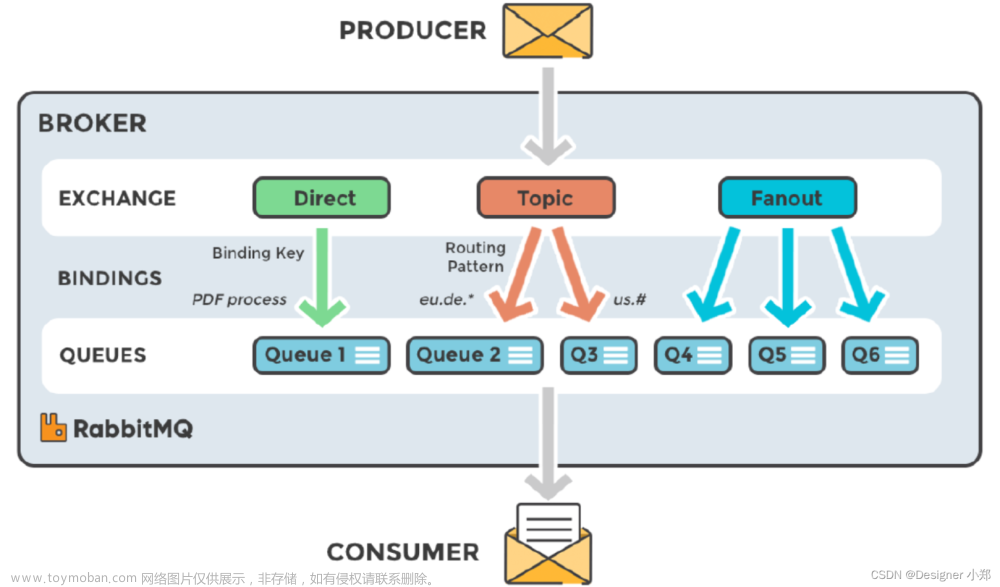目录
异步和同步如何选择
异步线程 同步收发消息
一、导入依赖库
二、创建RabbitMQ配置类
三、创建消息任务类
异步和同步如何选择
·依靠多线程,Java代码可以同步执行也可以异步执行
·RabbitMQ提供了同步和异步两种收发消息模式
·我们采用 Java异步线程 MQ同步收发消息
异步线程 同步收发消息

一、导入依赖库
在 pom.xml 文件中添加RabbitMQ的依赖库
<dependency>
<groupId>com.rabbitmq</groupId>
<artifactId>amqp-client</artifactId>
<version>5.9.0</version>
</dependency>
<dependency>
<groupId>org.springframework.boot</groupId>
<artifactId>spring-boot-starter-amqp</artifactId>
</dependency>二、创建RabbitMQ配置类
连接 RabbitMQ 需要用到 ConnectionFactory ,所以我们要自己创建好 ConnectionFactory 对象然后注册给Spring框架,这就需要我们创建 RabbitMQConfig 类。
@Configuration
public class RabbitMQConfig {
@Bean
public ConnectionFactory getFactory(){
ConnectionFactory factory=new ConnectionFactory();
factory.setHost("localhost");
factory.setPort(5672);
return factory;
}
}三、创建消息任务类
以前我们使用异步多线程的方式发送邮件,那么这次我们要创建的多线程任务类是用来收发RabbitMQ消息的,而且内部包含了同步执行和异步执行两种方式。文章来源:https://www.toymoban.com/news/detail-518306.html
 文章来源地址https://www.toymoban.com/news/detail-518306.html
文章来源地址https://www.toymoban.com/news/detail-518306.html
@Component
@Slf4j
public class MessageTask {
@Autowired
private ConnectionFactory factory;
@Autowired
private MessageService messageService;
/**
* 同步发送消息
*
* @param topic 主题
* @param entity 消息对象
*/
public void send(String topic, MessageEntity entity) {
// 向MongoDB保存消息数据,返回消息ID
String id = messageService.insertMessage(entity);
// 向RabbitMQ发送消息
try (Connection connection = factory.newConnection();
Channel channel = connection.createChannel();
) {
// 连接到某个Topic
channel.queueDeclare(topic, true, false, false, null);
// 存放属性数据
HashMap map = new HashMap();
map.put("messageId", id);
// 创建AMQP协议参数对象,添加附加属性
AMQP.BasicProperties properties = new AMQP.BasicProperties().builder().headers(map).build();
channel.basicPublish("", topic, properties, entity.getMsg().getBytes());
log.debug("消息发送成功");
} catch (Exception e) {
log.error("执行异常", e);
throw new EmosException("向MQ发送消息失败");
}
}
@Async
public void sendAsync(String topic, MessageEntity entity) {
send(topic, entity);
}
/**
* 同步接收数据
*
* @param topic 主题
* @return 接收消息数量
*/
public int receive(String topic) {
int i = 0;
// 接收消息数据
try (Connection connection = factory.newConnection();
Channel channel = connection.createChannel();
) {
// 从队列中获取消息,不自动确认
channel.queueDeclare(topic, true, false, false, null);
// Topic中有多少条数据未知,所以使用死循环接收数据,直到接收不到消息,退出死循环
while (true) {
// 创建响应接收数据,禁止自动发送Ack应答
GetResponse response = channel.basicGet(topic, false);
if (response != null) {
AMQP.BasicProperties properties = response.getProps();
// 获取附加属性对象
Map<String, Object> map = properties.getHeaders();
String messageId = map.get("messageId").toString();
// 获取消息正文
byte[] body = response.getBody();
String message = new String(body);
log.debug("从RabbitMQ接收的消息:" + message);
MessageRefEntity entity = new MessageRefEntity();
entity.setMessageId(messageId);
entity.setReceiverId(Integer.parseInt(topic));
entity.setReadFlag(false);
entity.setLastFlag(true);
// 把消息存储在MongoDB中
messageService.insertRef(entity);
// 数据保存到MongoDB后,才发送Ack应答,让Topic删除这条消息
long deliveryTag = response.getEnvelope().getDeliveryTag();
channel.basicAck(deliveryTag, false);
i++;
}
else {
// 接收不到消息,则退出死循环
break;
}
}
} catch (Exception e) {
log.error("执行异常", e);
throw new EmosException("接收消息失败");
}
return i;
}
@Async
public int receiveAsync(String topic) {
return receive(topic);
}
/**
* 同步删除消息队列
*
* @param topic 主题
*/
public void deleteQueue(String topic){
try (Connection connection = factory.newConnection();
Channel channel = connection.createChannel();
) {
channel.queueDelete(topic);
log.debug("消息队列成功删除");
}catch (Exception e) {
log.error("删除队列失败", e);
throw new EmosException("删除队列失败");
}
}
@Async
public void deleteQueueAsync(String topic){
deleteQueue(topic);
}
}
到了这里,关于利用RabbitMQ实现消息投递削峰填谷的文章就介绍完了。如果您还想了解更多内容,请在右上角搜索TOY模板网以前的文章或继续浏览下面的相关文章,希望大家以后多多支持TOY模板网!














